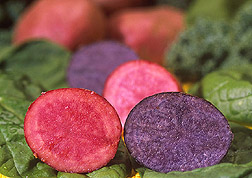This page has been archived and is being provided for reference purposes only. The page is no longer being updated, and therefore, links on the page may be invalid.
|
Read the magazine story to find out more.
|
With Potatoes, More Color May Mean Better NutritionBy Linda McElreathOctober 24, 2001 Many consumers think that potatoes are an almost perfect food. They put them at the pinnacle of their Top 10 list of favorite vegetables, especially when the potatoes are french-fried to crisp perfection. Along with providing complex carbohydrates, potatoes are a source of important nutrients like niacin, thiamin, and vitamin C. So why would plant breeders want to improve on this already-popular dietary staple? Because brightly-colored red, orange and purple potatoes might one day provide health-promoting properties way beyond those present in today's mostly white- and cream-colored tubers. And bright-gold-fleshed and red-skinned potatoes already seem to have won a lot of consumer attention. Charles R. Brown, a plant geneticist with the Agricultural Research Service, thinks more colorful potatoes might give consumers better nutrition, as well as more variety in flavor. He is in ARS' Vegetable and Forage Crops Production Research Unit at Prosser, Wash. Brown has made dozens of breeding crosses, searching each new progeny for signs of additional health benefits. So far, the primary benefit likely to be derived from the more boldly colored potatoes seems to be heightened antioxidant activity. Brown thinks that the pigments that produce the colors may also function as antioxidants in the human diet. And the bright colors occur naturally. Brown identifies and selects his test plants from mainstream potato breeding programs. But even so, he needs to do more research to learn about traits such as composition and quantity of pigment, growing requirements, and yields before "colored spuds" such as these can be commercialized. To learn more, see the story in the October issue of Agricultural Research magazine. ARS is the chief scientific research agency of the U.S. Department of Agriculture. |

